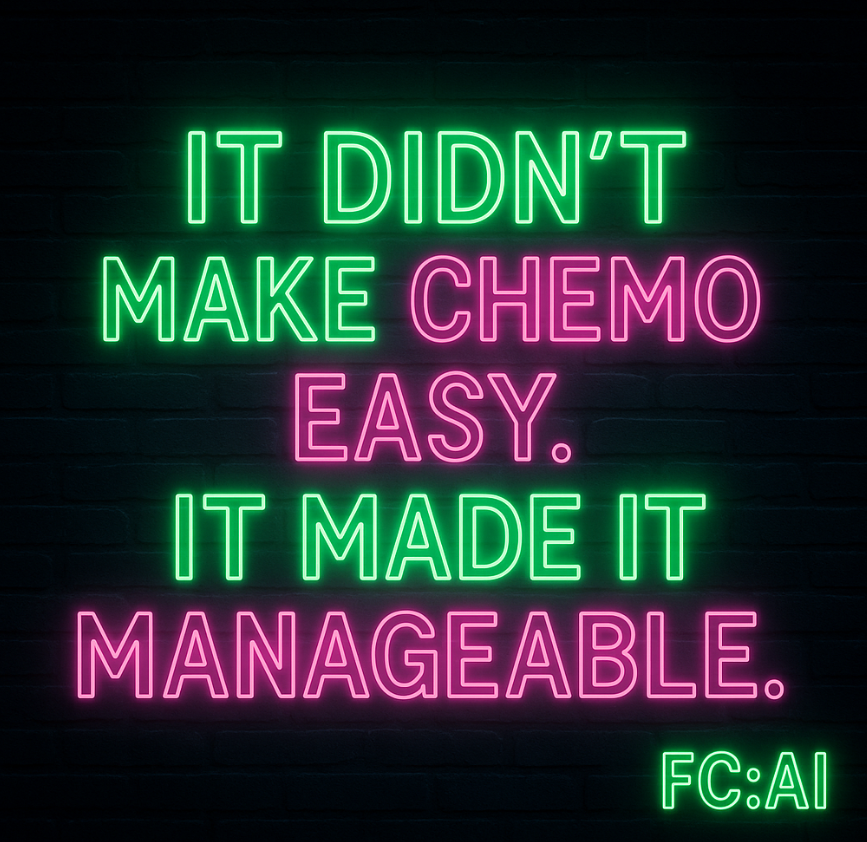FCAI: The Results (part 3): What Three Months of AI Tracking Actually Delivered
What 3 months of AI-assisted chemo tracking actually delivered: the patterns, improvements, and honest results from one of the most detailed real-world logs.
FC:AI TOOLS AND TIPS
Russ Read-Barrow
8/14/20253 min read


After three months of daily tracking, WHOOP data, and AI-assisted analysis... what did I really get out of it?
Short answer: it wasn’t perfect, but it was worth it. Some things improved massively. Some barely moved. And the whole process revealed just as much about the current state of major AI tools as it did about chemo itself.
The Data I Had to Work With
I tracked nearly every day from mid-April to mid-July 2025 (six chemo cycles). Despite both Manus and ChatGPT forgetting massive chunks of it, I recovered enough to work with:
77 WHOOP cycles (recovery, HRV, heart rate, sleep, strain)
110 sleep records
45 workouts
60 daily logs on symptoms: fatigue, nausea, mental clarity, mood, interventions
Was it perfect? No. Was it enough to see patterns? Definitely.
What Actually Changed During Treatment
WHOOP Recovery Scores
Cycle 1: Rock bottom at 14%. Barely functioning.
Cycle 6: Peaked at 98%. Higher than my baseline pre-chemo.
The trend was steady improvement over time.
Heart Rate Variability (HRV)
Range: 8 to 31 ms
Average: 19 ms
That peak of 31 ms told me the system was working. I was managing the stress.
Symptom Tracking
Fatigue: From 9–10 down to 0–1
Nausea: Peaked early, mostly gone by later cycles
Wellbeing: 2/10 in Cycle 1 up to 7–9/10 in Cycle 6
Mental clarity: 3/10 to 10/10 by the end
The Psychological Shift
Cycle 1: anxiety, uncertainty, dread.
Cycle 6: confidence, control, even optimism.
The biggest change wasn’t physical. It was mental. Daily tracking gave me a structure and a sense of agency when everything else felt chaotic.
The Patterns That Mattered
Day 3 Was Always the Worst
Confirmed by both symptom tracking and WHOOP data. Every cycle.
Recovery dropped, HRV tanked, symptoms spiked. Planning around it helped.
14-Day Cycle Rhythm
Day 1: Manageable with pre-meds
Day 2: Start of symptoms
Day 3: Hell
Days 4–7: Gradual recovery
Days 8–14: Back to baseline or better
By Cycle 6, even the worst days were more manageable. The baseline kept improving.
What Actually Helped
Domperidone (Daily)
Took it religiously. Nausea dropped and stayed down. Not fancy. Just consistent.
Dropping Dexamethasone
Started with four a day. Ended with none. Felt a bit rougher short-term but slept way better. WHOOP showed clear improvement in sleep when I cut it back.
Keto-ish Diet
Cutting carbs made digestion easier. Tracked it. Clear link. High carb days = more issues. Simple.
WHOOP-Guided Exercise
Recovery scores told me when to push and when to back off. When I ignored it, I paid the price.
Sleep Hygiene
Early dinner. Magnesium. Rigid bedtime. Nothing fancy, but consistently worked.
Medical Outcomes
I can't say tracking caused better medical outcomes. But my CEA (cancer marker) dropped significantly.
Better sleep, less nausea, more movement. All of it likely helped my body tolerate treatment. No proof, but a strong correlation.
Recovery After Chemo (Quick Look)
Two weeks post-chemo:
Recovery scores: 54.9% → 56.9%
REM sleep: up 25 minutes
HRV: dipped slightly (expected as things recalibrated)
The fact that sleep architecture bounced back so fast suggests the baseline held strong throughout.
Was It Worth It?
Time spent:
Daily tracking: 10mins
WHOOP checks: 2 mins
Weekly analysis: 10 mins
Data recovery (thanks AI): 5 hours
Total: x hours over 3 months
Benefits:
Predictable patterns within each cycle
Better symptom planning
Improved work productivity
Solid comms with my medical team
More control, less chaos
Biggest win: sense of control and owership. I felt like I had a say in how chemo went.
Tech Review: What Worked, What Didn’t
What worked:
WHOOP. Consistent, reliable, no faff. Data I could trust.
AI prompts. Helped structure the process and kept me going.
What didn’t:
Long-term AI memory. Utter crap. Both Manus and ChatGPT forgot weeks of data.
Pattern recognition? combo of me and the AI tools - but it always pointed me in the right dorection
Can Others Use This?
Yes. Here's what's replicable:
Identifying your own worst days
Tracking how interventions actually affect you
Using data to inform your choices, not just guess
Feeling more in control during a chaotic process
Realistic expectation?
With consistent tracking, you could improve quality of life during chemo by 15–40%. Not a miracle. But a massive difference between “barely coping” and “managing okay.”
Final Take
Three months of tracking gave me:
Better quality of life
Predictable cycles
Confidence in what worked
Proof that systematic tracking works better than guesswork
It didn’t make chemo easy. It made it manageable. That was the goal. At least I think it was.
If even one other person gets something useful from this, every hour of tracking was worth it.
FC:AI
© 2025 FC:AI. Built with zero bullshit during chemo.
All content © FC:AI unless otherwise credited.
